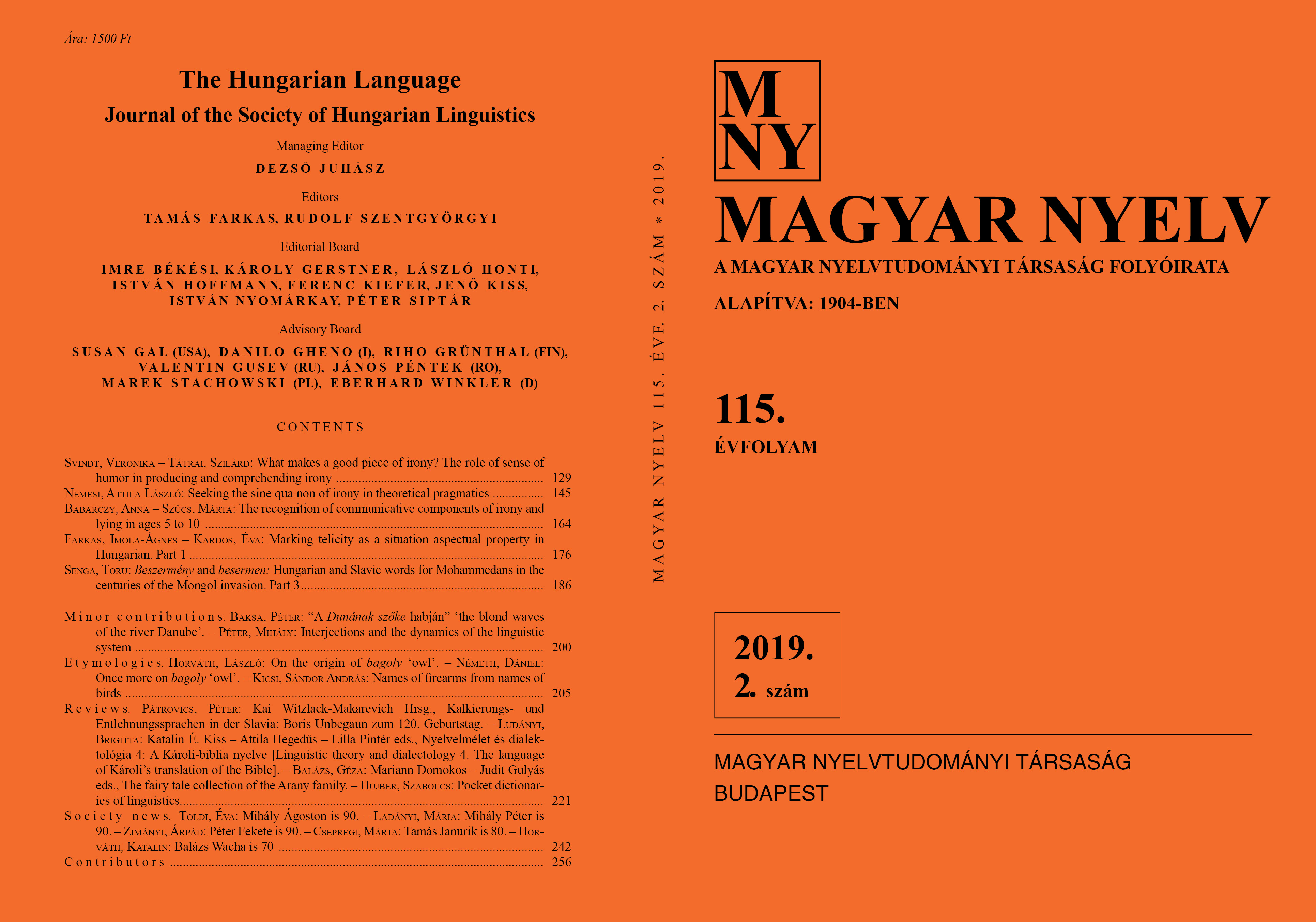Beszermény and besermen
Hungarian and Slavic words for Mohammedans in the centuries of the Mongol invasion. Part 3
DOI:
https://doi.org/10.18349/MagyarNyelv.2019.2.186Keywords:
Muslims, böszörmény, Old Hungarian beszermény, Old Russian besurmen ~ besermen, Old Czech bezzermene (pl.), the Bisermini of Plano Carpini, Chuvash-type Turkic languages, loanwordsAbstract
An earlier form of Hungarian böszörmény was roughly beszermény, usually not found in etymological dictionaries. Its first attested occurrence is the place name Bezermen from the 13th century. Its meaning is ’Muslim’. Words of the same form and meaning are also found in Old Russian and in Old Czech. The first time the form besurmen occurred in Old Russian chronicles was in an 1184 entry of the Kievan Chronicle. In a 1282 entry of the Laurentian Chronicle, besurmen occurs once, and besermen occurs five times. The abrupt and unexpected change is probably due to an unintended effect of a later copier’s or compliler’s own language. The form besurmen probably comes from the language of Polovtsians. Based on the fact that Volga Bulgarians were later referred to in Old Russian as besermen in the 14th century, we can assume that Old Russian borrowed the word from the language of the Volga Bulgarians, one of the Chuvash-type Turkic languages. The form besermen was widespread in the Principality of Vladimir-Suzdal first, and later it became dominant in the whole territory of Rus’. Hungarian beszermény may be a loanword from another Chuvashtype Turkic language, borrowed in the 9th century the latest. With respect to the origin of Old Czech Bezzermene (Besermené), Hungarian transmission is more probable than Eastern Slavic. In the thirteenth century, these words had the meaning ‘Muslim’ west of the Volga, as far as the Vltava River, with no particular ethnic reference. The same meaning is hidden in Bisermin as mentioned by Plano Carpini, mistakenly thought to be an ethnic name by the Franciscan monk. On the other hand, his fellow traveller, Benedictus Polonus, who was familiar with Slavic languages, took the Czech and Russian word to be a common noun, and did not mention the word Bisermin in his travelogue.
Downloads
Published
Issue
Section
License
Copyright (c) 2024 Toru Senga

This work is licensed under a Creative Commons Attribution-NonCommercial-NoDerivatives 4.0 International License.
Magyar Nyelv is a Diamond Open Access periodical. Documents can be freely downloaded and duplicated in an electronic format, and can be used unchanged and with due reference to the original source. Such use must not serve commercial purposes. In the case of any form of dissemination and use, Hungarian Copyright Act LXXVI/1999 and related laws are to be observed. The electronic version of the journal is subject to the regulations of CC BY-NC-ND (Creative Commons – Attribution-NonCommercial-NoDerivatives).
The journal permits its authors, at no cost and without any temporal limitation, to make pre-print copies of their manuscripts publicly available via email or in their own homepage or that of their institution, or in either closed or free-for-all repositories of their institutions/universities, or other non-profit websites, in the form accepted by the journal editor for publication and even containing amendments on the basis of reviewers’ comments. When the authors publicize their papers in this manner, they have to warn their readers that the manuscript at hand is not the final published version of the work. Once the paper has been published in a printed or online form, the authors are allowed (and advised) to use that (post-print) version for the above purposes. In that case, they have to indicate the exact location and other data of the journal publication. The authors retain the copyright of their papers; however, in the case of an occasional secondary publication, the bibliographical data of the first publication have to be included.



